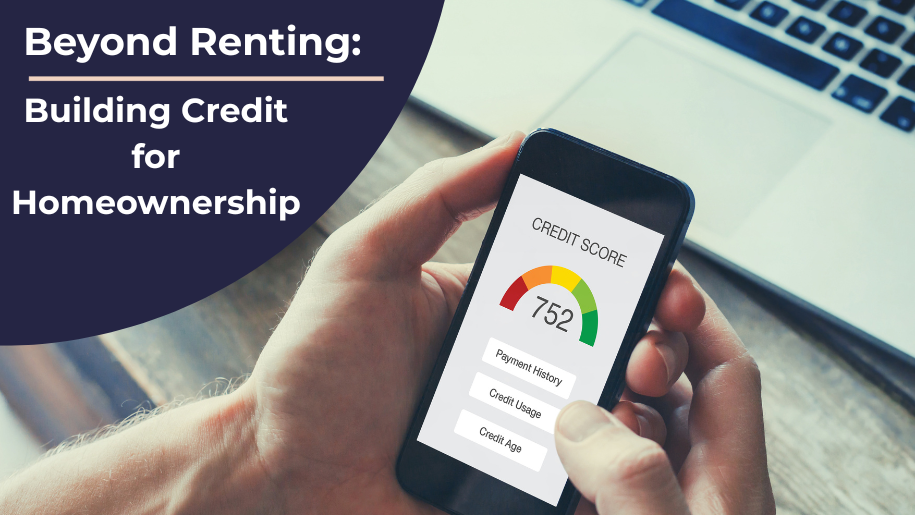At Tailored Homes Property Management we recognize that a critical part of property management is taking great care of our tenants. One of our goals is to see our tenants eventually become homeowners who will one day will entrust us with managing their own rental homes.
But, before you can become a homeowner—or even think about investing—your credit has to be in shape. Strong credit doesn’t just open doors to loans; it provides financial security, stability, and peace of mind.
To dig deeper into how credit impacts buying a home and building long-term wealth, Whitney Whitesides, VP of Property Management at Tailored Homes, sat down with Matt Davis, Owner of Complete Credit Plus, to talk through the most common questions people have about credit.
Check out the great credit building tips below to start planning your journey towards homeownership.
____________________
Whitney: Matt, let’s start at the beginning. Why do you call credit the “hidden key” to buying a home or investing?
Matt: Because credit determines access and cost. Lenders price risk. Strong credit signals lower risk, which unlocks better approvals (more lenders will work with you), better pricing (lower rates, lower fees, better terms) , and better leverage (higher limits, more flexible products). Over a 15–30 year mortgage, a 0.5 to 1.5% lower rate often translates into tens of thousands saved.
____________________
Whitney: So how exactly does my credit score affect the kind of loan I can get?
Matt: Your score influences many factors. First, approval - whether you qualify at all. It affects your rate: Each score tier (e.g., 620–639, 640–659, 660–679, etc.) typically maps to different rate/fee grids. Mortgage insurance: with conventional loans, higher credit can mean lower PMI. Fees and points: lower scores can mean more discount points needed. Product access: some programs (jumbo,HELOCs, 0% intro business cards) require stronger scores.
____________________
Whitney: What’s the single biggest factor in a credit score?
Matt: That’s easy! Payment history. One late payment can drop scores 60–110+ points and linger for years. Set automation and alerts to protect this at all costs. After that: utilization (balances vs. limits), age of credit, credit mix, and new inquiries.
____________________
Whitney: If someone looks at their credit and realizes it needs work, where should they start?
Matt: Pull all three bureaus with scores and full reports (Experian, Equifax, TransUnion). Make a triage list: recent late pays, high utilization cards, collections, identity mix-ups, public records. Stabilize payments. Make sure you turn on auto-pay for minimums and align due dates with payday. Lower your utilization by aiming for under 30% per card and overall and keep it under 10% for best scoring impact. Address errors by disputing inaccurate items with documentation. Build thickness. If you have a thin file, add a no-annual-fee card or become an authorized user on a well-managed, low-utilization, long-aged account.
____________________
Whitney: What’s the number one mistake people make when trying to fix their credit?
Matt: They focus on deleting everything instead of fixing behavior and structure. Chasing “quick deletions” while still paying late, maxing cards, or closing old accounts backfires. The winning formula is accuracy disputes + utilization control + bulletproof on-time payments.
____________________
Whitney: Let’s talk savings. How much can better credit actually save me on a mortgage?
Matt: Here’s an illustrative example. On a $350,000 30-year mortgage, moving from a mid-600s score to mid-700s can often lower the rate by 0.5% to 1.0%+. That’s roughly $100–$300/month, or $36,000–$108,000 over 30 years, before refinancing considerations. Plus, better credit can reduce PMI and closing costs.
____________________
Whitney: And does my credit score impact how much I’ll need for a down payment?
Matt: Indirectly, yes. While program minimums (e.g., FHA 3.5%, conventional 3–5%) are set, weaker credit can mean higher pricing that pushes borrowers to bring more cash to lower the rate, stricter reserve requirements, and fewer down payment assistance options. Stronger credit expands options and reduces add ons, so your cash goes further.
____________________
Whitney: How long does it usually take to raise a score enough to buy a home?
Matt: It depends where you’re starting. Quick wins can happen in 30–90 days if you pay down balances or fix errors. For more moderate issues, 3–6 months is common. For deeper challenges—like multiple derogatories or thin files—it can take 6–12 months or more. Timing depends on your starting point, what’s inaccurate vs. accurate-but-negative, and how aggressively you execute the plan
____________________
Whitney: What’s one “quick win” someone could do in the next 30 days to improve their credit?
Matt: Drop utilization before the statement cuts. Pay revolving balances down to under 10% utilization per card (not just overall). If you have one maxed card and one with room, move balances strategically or request a modest credit limit increase (request a “soft pull” of your credit if possible) to improve the ratio. Set payments to post 5–7 days before the statement date, so the reported balance is low.
____________________
Whitney: Do people really need a credit repair professional—or can they just do it themselves?
Matt: You can absolutely DIY with time, organization, and knowledge. A professional adds value when you:
- Have complex files (mixed credit, identity theft, legacy medical, reinsertions)
- Need strategic sequencing (what to dispute, when to settle, when to leave alone)
- Want faster execution and fewer errors
- Prefer guidance tied to a homebuying/investing goal with accountability and education
Think of it like a trainer: you can work out solo, but coaching accelerates results and avoids injuries.
____________________
Whitney: And finally, what’s your top piece of advice for someone who wants to use credit to build wealth?
Matt: Treat credit like a business system. Protect your payment history with automation and redundancy, keep utilization low and predictable, borrow strategically for assets that cash flow or appreciate, and track your data monthly. Pair great credit with cash reserves—credit unlocks doors, reserves keep them open. Consistency beats intensity. A year of disciplined habits outperforms a week of “hacks.”
____________________
Whitney: Thanks, Matt. I’m sure our tenants will really appreciate your wisdom and advice!
Matt: Anytime. The bottom line? Credit isn’t just a score—it’s a tool that helps you create stability, lower your costs, and prepare for future opportunities like homeownership. Whether you’re just starting to build credit or working to repair it, remember that every positive step adds up. A secure financial future begins with good credit.



